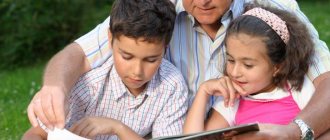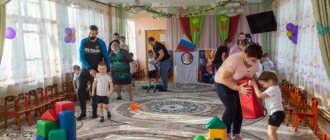Types of joint activities between children and parents
Types of joint activities of children with parents.
Organization of holidays:
children's birthday, Christmas holidays, Children's Day, Holiday of knowledge.
The holiday atmosphere will definitely bring adults and children closer together in preparing the environment, writing a script, creating a menu, and making prizes. It is better if each family member independently prepares competitions, costumes, games, surprises, and takes an active part.
Creativity
The child himself must become the initiator of such activities. The parent joins in the creative work offered by the child. At the same time, an adult can offer his own projects: making a collage from natural materials, publishing a family wall newspaper, making greeting cards. This promotes the development of children's imagination, independence and self-expression.
Reading books
There is a “Reading Hour” of books of the child’s choice or a special ritual before bedtime. At such moments, along with the development of the cognitive sphere, the child develops moral and personal qualities without direct moral teaching. And most importantly, at such moments the child has a desire to talk about his secrets and problems.
Cooperative games
Board games such as: lotto, dominoes; printed board games; verbal-logical, etc. enhance close interaction between children and parents. Play is a very pleasant activity for a child, within which he develops and at the same time is educated. During play with a child, an adult finds himself in a situation “on equal terms.” And when the child explains the course and rules of the game, the adult falls into the role of “learner.” In joint play activities, the formation of moral and volitional qualities of the child’s personality occurs.
Theatricalization
Children are fans of dressing up and transforming using the wardrobe of adults. Of course, at such moments the child needs spectators, who become parents. In such activities, children realize themselves and become liberated, practicing and acquiring new forms of communication.
Family excursions and trips
Such trips can be organized to a park, a forest, or a museum. The parent acts as the leader, and the child is involved in planning the route: where they will go, what to take from food, toys. During the excursion, the adult encourages the child to be active in learning about the environment.
Visiting theaters and cinemas
At the initial stage, the initiator of such visits is the parents, introducing the child to the world of beauty. Then the children themselves choose the place and topics of viewing.
Maintaining family albums, filling out the “Album of Discoveries”
This is an interesting, exciting activity between parents and a child, through which adults become clearer and closer to their children, and children become closer to adults, which helps strengthen family relationships. By getting to know himself, the world around him, and other people, a child can at any moment receive understanding and support from a loved one.
Joint play activities of parents and children (from work experience)
This is my first year working with my group of children and parents.
I started by deciding to establish a trusting relationship with my parents. In modern conditions of a kindergarten it is so difficult to do without the support of parents, without their participation in the life of the group and kindergarten. Only through joint efforts can we raise a person who has a thirst for knowledge, knows how to enjoy life and sympathize, who can do anything! After all, it is through interaction and cooperation with parents that one can achieve the full development of a child and his proper upbringing. Interaction should be based on the principles of joint activities of educators, parents and children. At the same time, the goal of family education, as well as public preschool education, should be the development of the child’s personality.
The great Russian teacher V.A. Sukhomlinsky wrote: “Education is, first of all, human studies. Without knowledge of the child - his mental development, thinking, interests, hobbies, abilities, inclinations, inclinations, there is no education... Without constant spiritual communication between teacher and child, without mutual penetration into the world of each other’s thoughts, feelings, experiences, emotional culture as the flesh and blood of culture is unthinkable pedagogical". Of course, he wrote about teachers and educators, but we must not forget that the first teachers and educators for a child are his parents.
But modern parents, for some reason, forget about this and leave the upbringing, education and development of their children to general education institutions. I ran into a problem: parents show little interest in the success of their children. It is very difficult to attract and interest them, but this is the most important task. It is sometimes so difficult to explain to parents that the child must not only be fed, clothed, and put to bed, but also communicate with him, teach him to reflect, think, and empathize. And how great it is to do everything together - play, walk, talk about different topics, share secrets, come up with different stories, do crafts. This is what I want to convey to the parents of my students by holding unusual conversations with them, consultations, seminars, workshops, parent meetings on various interesting topics that concern them so much. I rely on the requests of parents, and these requests are easy to identify through questionnaires, and sometimes I cover those topics and questions that are of interest to us educators and, I think, will be of interest to parents.
Yes, parents now are all literate people, with higher education, but, according to my observations, they do not know how to build relationships with children in play activities. But play is one of the leading activities of a child. Now the children stop playing. And the games children play have become sad and aggressive. The chain of transmission of gaming tradition from one generation to another has been broken. I decided to bring children and parents closer together, to show parents that their children are creative and capable, but they require attention and a partner to play with.
To solve this problem, I set myself the following tasks in working with parents:
1. To develop in parents confidence in their own pedagogical capabilities, the ability to know and understand their children.
2. Enrich the emotional joint experience of family members, teach interaction skills between them through gaming activities.
3. Develop an interest in children and parents in spending time together.
4. To unite parents and children, to ensure that children understand their parents, and parents understand their children.
5. Introduce parents to the traditions and forms of gaming leisure in families.
6. Help parents discover new opportunities for the child to reflect the world in play.
In order to find out the meaning of joint games in the families of my students, I conducted a survey of parents and children “Game in the life of my family.” Based on the results of the survey, I concluded that parents want to play with their children, but do not know how to properly organize joint play activities with their children.
I drew up a plan for joint gaming activities, where parents will be partners, participants in children’s games, and not spectators or observers.
Prepared consultations for parents “Growing up while playing”, “What toys do your children need?” The goals of these consultations are: to make parents understand what role play plays in the child’s life; give knowledge about the meaning of the toy, its role in the child’s play.
My next step was to hold a parent meeting in the form of an oral journal on the topic “Why does a person need childhood?” At the meeting, questions were discussed: do parents remember their childhood, what is characteristic of it? What interests and worries their child? How would they like it to be? At the meeting, parents got acquainted with the statements of teachers and scientists about the game and its role in the life of the child. At the end of the meeting, parents received instructions on “How to play with your child correctly.”
There are many forms of organizing joint work between educators and parents. One of these forms is holding competitions, entertainment, holidays among parents, among parents and employees, etc. in kindergarten. The kindergarten traditionally celebrates the New Year on March 8 and February 23. But I realized that children’s lives become more interesting if we organize some non-standard, fun holidays, to which parents are invited not only as spectators, but also as participants.
A holiday is a bright event in a child’s life, filled with unusual, joyful and deep impressions. K.D. Ushinsky wrote: “Let everyone remember his childhood, and he will see that a holiday for a child is not at all the same as for us, that this is really an event in a child’s annual life, and that a child counts the days from holiday to holiday, just like we do.” We count our years from one important event to another.” I agree with him. But the holiday is doubly interesting for children if parents take part in it.
It has become a good tradition for our group to hold parent-child celebrations. This is a good reason to spend them with your parents, not for them. The scenarios are drawn up in such a way that parents are direct participants in the holiday. This involves cooperation with parents and communication with children through joint activities. Such holidays take more than one day to prepare. This is painstaking work. It is necessary to think over the organization of the holiday, the decoration of the hall, develop a script, etc. With children, before each event, I make invitations for parents. How nice it is to see the joyful faces of parents when their child presents an invitation made with their own hands! It would be a shame not to come and take part in order to please your son or daughter.
Holidays: “Autumn Birthday”, “Christmas Tree Festival”; leisure activities: “Together with Mom”, “Wide Maslenitsa”; entertainment: “Winter fun”, “Mom is my sunshine”, “Dad can do anything!” and others were held with various attractions, competitions, competitions, relay races and other game subjects. Mothers, grandmothers, fathers and their children took part in them. These events not only bring parents and children together, but also create an atmosphere of warmth and trust in the relationship between the teacher and parents. You learn a lot of interesting things about the families of your students, about their traditions, hobbies, about the system of raising children in the family, and most importantly, parents reveal their talents and creative abilities that they didn’t even know about. The unique emotional and spiritual atmosphere of the holiday is created by the general mood and activity of all participants in the holiday: children, parents, teachers. Joint holidays with parents remain in the memory of adults and children for a long time. They teach the child to love and take care of his family, his father and mother, the spirit of his home. Parents get to know each other well in joint competitions, competitions, and relay races. Adults and children learn to understand each other better, and parents have the opportunity to observe their child’s interactions with others. Children see a positive example of communication and relaxation.
I saw that as a result of such events, parents changed their attitude towards the child (he can and knows a lot) and towards us, the educators who work with their children every day, putting their soul, knowledge and strength into the work of education.
A special place is occupied by exhibitions of joint creativity between parents and children, for example, “Autumn is a Magician”, “Magic Snowflake”, “Crazy Hands”. The main goal of such events is to bring generations (children, parents, grandparents) closer together and strengthen child-parent relationships. In addition, exhibitions of joint creativity foster hard work, accuracy, attention to loved ones, and respect for work. This is the beginning of patriotic education, because love for the Motherland is born from a feeling of love for parents, one’s family.
Especially loved by children are “Meetings with Interesting People”, where their guests are parents who introduce themselves to children in a different way - as professionals in their field, interesting people. For example, the guests of our group were my mother, a doctor from a railway clinic, and my father, a builder. Such meetings enrich children's knowledge about the professional activities of adults, expand their general awareness of the world around them and their horizons, and also form in them a certain elementary experience of professional actions and promote early “professional orientation.” Role-playing games of a professional orientation play a major role in shaping children’s ideas about the professional activities of adults. Therefore, the result of such meetings are role-playing games, for example, “Polyclinic”, “Why should we build a house?”
I also plan to invite my grandmother to visit, who will show her crocheting skills; a mother who agrees to organize a “Balloon Festival” for the children.
We must not forget that our kindergarten is from the railway. I plan to hold a literary lounge “Here is our train rushing, the wheels are knocking...”, where parents and children will read poems, fairy tales, stories about the railway, their own compositions.
I believe that thanks to such events I create conditions for interaction between children and parents, which helped improve emotional contact between them and taught them how to play together.
Author: Irina Aleksandrovna Safarova, teacher, NDOU “Kindergarten No. 118 of JSC Russian Railways”, Samara, Russia.
The article is published in the author's edition.
“Together it’s fun and useful!” (or about the joint creativity of children and parents)
December 22, 2019
Tesh Olga Vladimirovna
teacher
This article talks about the benefits of joint creativity between children and parents, the influence of creative activities on the development of a child’s creative thinking, overcoming the problems of adaptation to kindergarten, as well as the opportunity to satisfy the child’s need for communication and self-affirmation through creative activities.
The child and his parents are in constant contact while the baby grows and gets stronger. He is given maximum attention in the family, his needs and desires are brought to the fore. But as soon as the child is sent to preschool, mom and dad move away, they constantly have no time, they are tired from work, brothers and sisters learn homework, that is, everyone does their own thing. And here is the result: the child feels unnecessary, he is capricious, sick, and does not want to go to kindergarten. Many people think that these are adaptation problems and that the baby will gradually cope with them. However, if parents do not find optimal solutions between their own employment and the child’s need for interaction, then the negative attitude towards the preschool institution will only intensify, and the child will become withdrawn and distrustful.
Psychologists from all over the world assure that joint creative activities between parents and children can solve many problems of adaptation, reduce psychological stress, bring a lot of positive emotions to communication, and teach effective cooperation. In this case, the specific type of joint activity does not matter: it could be drawing, crafts, memorizing poems or playing out fairy tales.
Therefore, creative interaction between parents and child not only compensates for the lack of attention taken away by the crazy rhythm of modern life, but also helps the child express himself, realize his importance in the family, and provides parents with the opportunity to deepen the world and needs of their child. It is especially useful when children of different ages take part in the creative process. Such activities become an excellent platform for teaching mutual assistance, respect for elders, responsibility for younger ones, and also unites the whole family in a common cause.
Regular joint creations lead to the fact that a child turns from an uninitiative helper into a real researcher, a pioneer, he learns to think outside the box. The result of joint creativity is not only the acquisition of experience in this area, but also the well-being of the baby, the joy of communication and pride in the presented result.
At first, when he sees ordinary objects, he will begin to form unique, bold associations, then he will delight his loved ones with an original approach to solving various problems at school or with a creative surprise for his birthday. Subsequently, a child who was constantly trained in childhood will reveal his full creative potential at an older age, will have a lot of ideas and find more and more original ways to implement them.
Thus, if at least once a week (or better yet, more often) you devote time to joint creativity, then the baby will never feel detached and unnecessary, the family will have common interests, and the young creator will definitely prove himself in the future.
Share with friends
Teaching crochet to children writing with their left hand. Design and research activities in Russian language lessons in elementary school
You do not have sufficient rights to add comments
You must be logged in to post comments. If you do not yet have an account on our website, we invite you to register. It will take no more than 5 minutes.
Comments
Zibareva Lyudmila Anatolyevna
08.01.2020 22:08
Olga Vladimirovna, excellent article! Now it is very important to develop the creative potential in children, to give them the opportunity to be self-confident, we, teachers, help them with this. But we must not forget about the role of the family... after all, it often turns out that parents themselves do not know how to play with their children, do not know how to fantasize and create... and the family is the main example for the child. You very accurately noticed and suggested options for joint creativity.
Report to moderator
Ryzhenkina Irina Viktorovna
21.02.2020 07:28
Very informative and relevant article. I agree that joint creativity between children and parents brings great benefits in communication. Thank you very much!
Report to moderator


